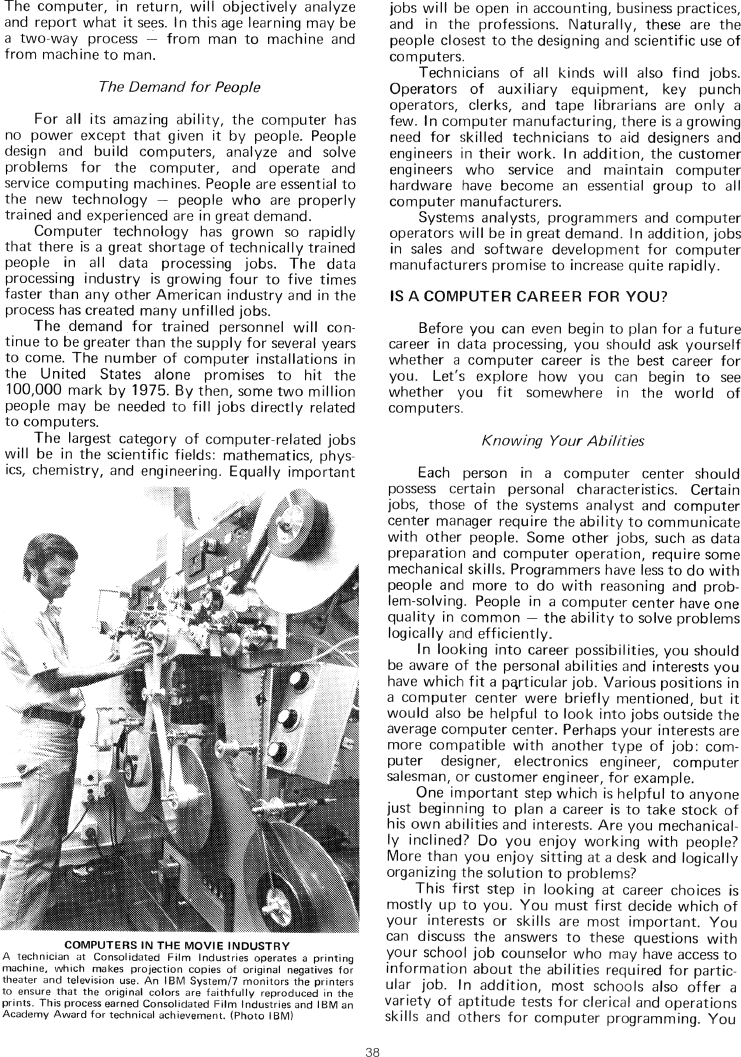The Best of Creative Computing Volume 1 (published 1976)
A Computer Career for You? (Demand for Trained Personnel)

The computer, in return, will objectively analyze and report what it sees. In
this age learning may be a two-way process - from man to machine and from
machine to man.
The Demand for People
For all its amazing ability, the computer has no power except that given it by
people. People design and build computers, analyze and solve problems for the
computer, and operate and service computing machines. People are essential to
the new technology - people who are properly trained and experienced are in
great demand.
Computer technology has grown so rapidly that there is a great shortage of
technically trained people in all data processing jobs. The data processing
industry is growing four to five times faster than any other American industry
and in the process has created many unfilled jobs.
The demand for trained personnel will continue to be greater than the supply for
several years to come. The number of computer installations in the United States
alone promises to hit the 100,000 mark by 1975. By then, some two million people
may be needed to fill jobs directly related to computers.
The largest category of computer-related jobs will be in the scientific fields:
mathematics, physics, chemistry, and engineering. Equally important
COMPUTERS IN THE MOVIE INDUSTRY
A technician at Consolidated Film Industries operates a printing machine, which
makes projection copies of original negatives for theater and television use. An
IBM System/7 monitors the printers to ensure that the original colors are
faithfully reproduced in the prints. This process earned Consolidated Film
Industries and IBM an Academy Award for technical achievement. (Photo IBM)
jobs will be open in accounting, business practices, and in the professions.
Naturally, these are the people closest to the designing and scientific use of
computers.
Technicians of all kinds will also find jobs. Operators of auxiliary equipment,
key punch operators, clerks, and tape librarians are only a few. In computer
manufacturing, there is a growing need for skilled technicians to aid designers
and engineers in their work. In addition, the customer engineers who service and
maintain computer hardware have become an essential group to all computer
manufacturers.
Systems analysts, programmers and computer operators will be in great demand. In
addition, jobs in sales and software development for computer manufacturers
promise to increase quite rapidly.
IS A COMPUTER CAREER FOR YOU?
Before you can even begin to plan for a future career in data processing, you
should ask yourself whether a computer career is the best career for you. Let's
explore how you can begin to see whether you fit somewhere in the world of
computers.
Knowing Your Abilities
Each person in a computer center should possess certain personal
characteristics. Certain jobs, those of the systems analyst and computer center
manager require the ability to communicate with other people. Some other jobs,
such as data preparation and computer operation, require some mechanical skills.
Programmers have less to do with people and more to do with reasoning and
problem-solving. People in a computer center have one quality in common - the
ability to solve problems logically and efficiently.
In looking into career possibilities, you should be aware of the personal
abilities and interests you have which fit a particular job. Various positions
in a computer center were briefly mentioned, but it would also be helpful to
look into jobs outside the average computer center. Perhaps your interests are
more compatible with another type of job: computer designer, electronics
engineer, computer salesman, or customer engineer, for example.
One important step which is helpful to anyone just beginning to plan a career is
to take stock of his own abilities and interests. Are you mechanically inclined?
Do you enjoy working with people? More than you enjoy sitting at a desk and
logically organizing the solution to problems?
This first step in looking at career choices is mostly up to you. You must first
decide which of your interests or skills are most important. You can discuss the
answers to these questions with your school job counselor who may have access to
information about the abilities required for particular job. In addition,
schools also offer a variety of aptitude tests for clerical and operations
skills and others for computer programming. You


